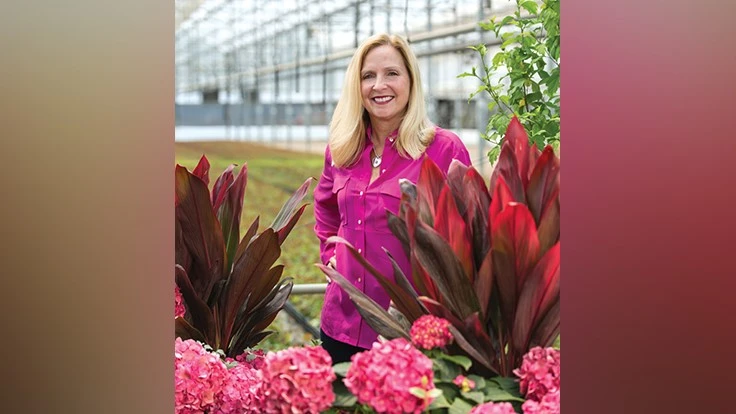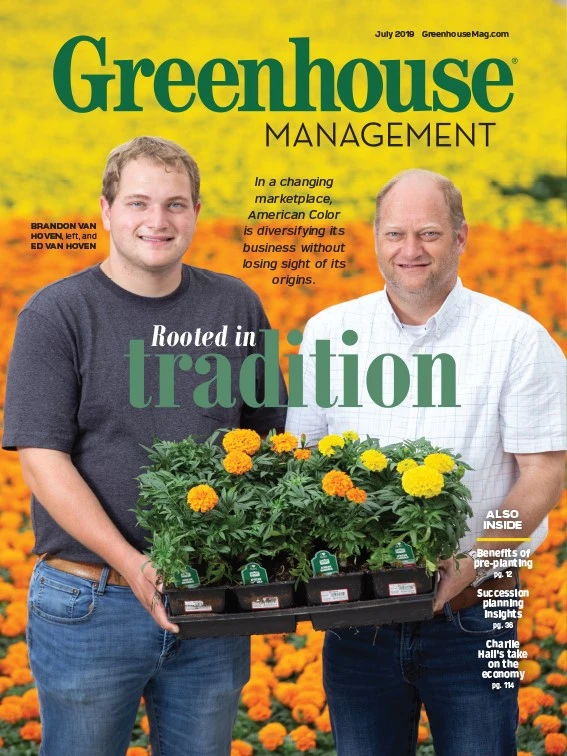

As a fourth-generation leader, Terri McEnaney bestrides the preservation of her family’s legacy and the evolution of expansion and innovation for Bailey Nurseries.
Terri’s grandparents instilled in her a fundamental sense of compassion when it comes to dealing with others. They led by example and she grew up emulating their values.
“My grandparents had a lasting impact on my values and how I make choices and decisions every day,” Terri says. “Their humble and welcoming attitude showed me how important it is to treat everyone with respect and openness.”
And it was her grandparents who offered her a leadership position in the family business.
“When they both encouraged me to come back to the nursery, it gave me the confidence and support I needed to step up and take on a leadership role while reminding me of the importance of surrounding yourself with good people, listening and empowering others to succeed.”
Terri grew up at the nursery, working summers and after school alongside her family. But after high school graduation, she chose to pursue a career in finance. Armed with an accounting degree, she took a job at 3M working in the finance and cost-analysis departments.
“I wanted to go somewhere I could prove myself and learn as much as I could,” she says.

At 3M Terri was involved in several of the company’s functions including research and development, marketing and product production.
“3M had tremendous supervisory development and training, including job sharing,” she says.
While a career was extremely important to her, after eight years at 3M, Terri left the company to start a family. She focused on that new role full time, raising three sons (Ryan, Joe and Dan) and one daughter (Megan).
She found joy in raising children and learned a whole new set of management skills.
“Being a parent is one of the most rewarding things you can ever experience. It changes who you are because it’s such a big part of your life,” she says. “It’s no longer all about you. It also teaches patience and teaches you how to listen.”
In the early ’90s when her children were still young, she felt a tug to contribute to the family business. She returned to the nursery part-time. Several years later her family asked if she’d take on more responsibility and go full-time.
“That was a big decision for me. But the encouragement I received from my grandparents made me feel like I had something to bring to the table,” Terri says. “They felt like I was a good listener and that my experience from 3M would be valuable to the nursery business.”
In 2001, Terri became president of Bailey Nurseries, the company her great-grandfather founded in 1905.

An ear for leadership
Terri’s grandparents noticed a valuable trait in her skill set – her ability to listen. Terri is an active listener who gives full attention to the speaker whether it’s an employee, a colleague, a customer or a family member.
“Terri has this amazing combination of being compassionate and a good listener. She wants, to the best of her ability, to make everyone feel like they’ve been heard,” says Brian Mark, a friend and member of the Bailey advisory board. “And that is really important in a family business because of the emotion attached to that scenario. She asks the right questions at the right time and listens intently to answers.”
One of her main goals as company president is to spend a great deal of time visiting the nursery’s seven locations in Minnesota, Illinois, Oregon, Washington and Georgia.
“It’s important to me to meet with everyone in our organization and acknowledge their importance. It’s one of the most rewarding things I do,” she says.
Recently Terri met with a group of employees who had just completed a leadership academy through the Minnesota Nursery and Landscape Association. During the academy, each participant was assigned a project and Terri wanted to hear what they took from the experience.
“They said they’d love to be able to cross-train going from propagation to the container fields, for example. They want to be exposed to all of the different areas in the company,” she says. “This will allow them to expand their knowledge and potentially make a career move, perhaps as a foreman in another division. Thanks to their feedback, we’re going to make this happen. Asking for feedback is so important because employees often see things we may not see as managers.”
Brian describes her as “tremendously accessible.”

“There isn’t any hierarchy that someone needs to go through to talk to her. She sees the good in people, she has compassion and she holds people accountable. That’s a difficult balance but one that helps her and the nursery succeed,” Brian says.
A few years ago, Bailey conducted an exercise that revisited the company’s core values and asked employees, “What does ‘growing what’s next’ mean to you?” Growing what’s next is the company motto.
“We learned that it’s not just about growing plants, but growing teams and individuals and utilizing the foundation of the values we have and how you apply that to what you do every day,” she says. “Our teams talked about planning and delegation, including how difficult that can be. I was really impressed with how many brought up that problem and how conscientious they are about their roles.”
Each summer Bailey hosts a customer expo which provides Terri and the management team a tremendous opportunity to listen to their customers.
What started out as a small gathering some 20 years ago has morphed into the company’s largest event. The expo is open to all Bailey customers, who have the chance to see new introductions, new processes, review the brands, talk face-to-face with employees and management and sit in on educational seminars.
“When our customers come to visit us and see the breadth of what we do and meet the crews who are doing it, they get a better understanding of the offerings we have and the contacts they have access to,” Terri says. “It’s a huge undertaking, but it helps improve every part of the business — from brand management to merchandising for our retail customers to growers with production. A customer may not buy anything that day, but it certainly strengthens the relationship with that customer.”
Terri and her team also listen to outside help in the form of an advisory board. The board is made up of carefully selected people from different business backgrounds and industries. They meet three times a year and focus on strategy, family governance and financials, and are paid for their time.
“Their perspective is invaluable. I believe in life-long learning and listening to other people’s perspectives before developing my own opinion. They act as a barometer to our progress. They challenge us. I encourage other companies to do something similar.”

The face of change
Change is necessary for survival, but also for success and Terri faces it with optimism and courage.
“It doesn’t matter if you’ve been around five years or 105 years, you have to change with the market — sometimes dramatically — to continue to thrive and be successful,” she says.
Bailey has experienced immense change in its business model. The company went from “growing plants in black pots to becoming more of a marketing company,” Terri says.
“Take Endless Summer as an example. We recognized that we alone couldn’t do justice bringing that to market and we asked other growers to help by being licensees. It was a significant change in the way we produce plants and how products are brought to market,” she says. “There was as much enthusiasm as there was skepticism. But we learned a great deal from our partners all over the world. As we bring new genetics to the market, change is constant in our business.”
The dramatic shift in the economy during the most recent recession forced the nursery industry to change.
“During the downturn, all of our divisions had to hunker down. We chose to close our operations in Iowa, and that was a very difficult time for everybody,” she says. “That situation forced us and others in our industry to acknowledge that we must understand our financials.”
The recovery from the recession also brought new opportunities. In the fall of 2018, Bailey acquired Carlton Plants, an Oregon-based bareroot nursery.
“Bringing Carlton Plants into our organization balances out our offerings so we’re not so heavily reliant on the container business,” Terri says. “Both organizations are focused on quality and process improvement. They’re coming up with new ideas, and that’s been the most exciting thing that’s come out of the acquisition. Change is not easy, but I’ve been impressed with how our people have embraced it and how they’re sharing information and successes between the groups.”
Sharing experiences


Terri’s willingness to share her experiences and advice will no doubt benefit the next generation of nursery industry leaders. One of her key recommendations is to be willing to let go and delegate “so that they may grow and gain confidence.”
“As leaders, we need to make sure we’re exposing young people to other aspects of the business and industry to help them develop a career path that is rewarding and satisfying,” she says.
“Encourage them to speak up and share their ideas and observations. Reinforce their importance and how their role contributes to the overall goals of the company. It’s important for us to learn from and listen to young professionals, since they see things in different ways and relate to our future customers.”
With experience, Terri learned to focus on one thing at a time.
“I used to think multitasking was the best thing, but once my kids were grown, I started to disagree with that philosophy,” she says.
“I really make an effort to direct my focus on one thing. I’m able to do that because I have a lot of really good people I work with and a lot of confidence in their decision-making capabilities.”

Explore the July 2019 Issue
Check out more from this issue and find your next story to read.
Latest from Greenhouse Management
- Anthura acquires Bromelia assets from Corn. Bak in Netherlands
- Top 10 stories for National Poinsettia Day
- Langendoen Mechanical hosts open house to showcase new greenhouse build
- Conor Foy joins EHR's national sales team
- Pantone announces its 2026 Color of the Year
- Syngenta granted federal registration for Trefinti nematicide/fungicide in ornamental market
- A legacy of influence
- HILA 2025 video highlights: John Gaydos of Proven Winners





